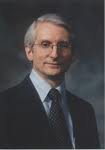-
(b.) - ?1942
Bio/Description
He took an early interest in science and won the grand award of the Southern Connecticut Science Fair in 1959 for an algebraic computer built from pinball machine parts. He received a BEE degree from Manhattan College, and MS and PhD from MIT. He has served on the faculties of Princeton, Purdue, George Mason, and Naval Postgraduate School, and as founding director of RIACS at NASA-Ames research center. In his early work in virtual memory, he discovered the locality principle and used it to design the working set model for program behavior, which solved the severe thrashing problem encountered in early virtual memory systems, and which gave near optimal system performance. The model is cited in every operating systems textbook and is used in modern operating systems including Windows, MacOSX, and Redhat Linux. The locality principle is used in caching systems from processors to Internet edge and proxy servers. He was a co-founder of the CSNET project, which created a worldwide community network for computer science, with approximately 50,000 users at 165 sites by 1985; CSNET was recognized by the 2009 Internet Society Postel Award for bring a critical bridge from the original research undertaken through the ARPANET to the modern Internet. In the 1990s, he was ACM's project leader and chief architect of the ACM Digital Library, the first comprehensive DL for any professional society, now used by millions of people worldwide. His thought has significantly shaped computing curricula through ACM and IEEE. He received in 2007 a special longevity service award from ACM for 40 years of continuous service including president, vice president, and three board chairs. He has received a total of 26 awards for technical contribution, education, and service to the profession. His is a prolific author, with 9 books and 350 published articles.
-
Date of Birth:
1942 -
Gender:
Male -
Noted For:
Denning working set, virtual system pioneer, CSNET co-founder -
Category of Achievement:
-
More Info:


